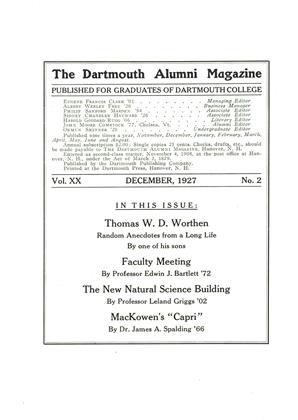Nine hundred undergraduates, under the leadership of members of Palaeopitus and representatives of the White River Junction Red Cross, lent a hand November 9th in digging out jhe town of Hartford, Vermont, which includes White River Junction. Hartford, at the juncture of the White and Connecticut rivers, was badly hit by the flood which caused great damage to life and property in Vermont and New Hampshire.
The expedition of students left Hanover on a train of flat cars at eight o'clock in the morning and spent the entire day in shoveling mud out of cellars, filling in washouts on roads, and in cleaning up the town in general. There was nothing soft about the job the residents of White River and vicinity thoroughly appreciate the backbreaking efforts of the emergency army of laborers from Hanover. November 16th about one hundred more men went to West Hartford, Vt., and helped complete the work started the week previous.
The following editorial from the New York Sun is of interest in connection with the relief work done by Dartmouth students: "Regardless of what may happen on the gridiron today or has happened all season, a Dartmouth team is winning one of the most glorious victories ever won by wearers of the Green. We are not alluding to the football players of the New England university but to its hundreds of students who with pick and shovel are engaged in digging Vermont villages out of the debris of the recent floods.
"Young men up in that part of the world are sturdy. Most of them are accustomed to more or less hard work. Boys from farms, farming regions and small towns do not regard it as anything particular to talk about when they wear blisters on their hands by honest toil. It is part of the code in which they are reared to turn to and do whatever task needs to be done. It is therefore not surprising that when a call came from Vermont for help in the manual labor necessary to restore things to something like order the students of Dartmouth volunteered as for a lark. In a sense it is a lark, for there are times when there is as much fun in swinging ax or pick as in booting a football. The chief difference between labor and exercise is in the enjoyment to be got out of the two; what better enjoyment could a normal boy have than in helping out a neighbor who is in trouble?
"It is not the country boys alone, however, who are assisting in this emergency. Some are from cities. A few are from homes of sufficient wealth to guarantee their scions immunity from much necessity for physical toil. These are trundling wheelbarrows, lifting rocks, shoveling mud and gravel with as much gusto as are their country-bred classmates. Here and there a professor has laid aside the dignity of the school room to pile up broken timbers, perhaps at the direction of an undergraduate.
"There is no quarterback to call signals for this Dartmouth team. There is indeed a cheering section but it is too remote to be visible or for its nine 'rahs—or whatever it is that Dartmouth cheering section give—to be audible. But what it is doing will be remembered with gratitude in many a Vermont valley long after the most pertinacious alumnus has forgotten the score in the Brown game of 1927."
 View Full Issue
View Full Issue
More From This Issue
-
 Lettter from the Editor
Lettter from the EditorEditorial Comment
December 1927 -
 Article
ArticleTHOMAS W. D. WORTHEN
December 1927 By One of His Sons -
 Article
ArticleFACULTY MEETING
December 1927 By Professor Edwin J. Bartlett '72 -
 Article
ArticleALUMNI ASSOCIATIONS
December 1927 -
 Class Notes
Class Notes1918
December 1927 By Frederick W. Cassebeer -
 Class Notes
Class NotesClass of 1911
December 1927 By Nathaniel G. Burleigh









